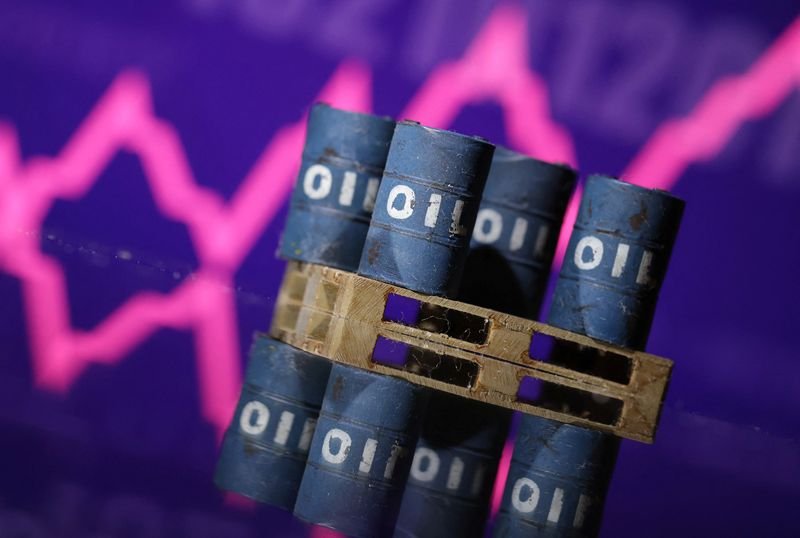Oil settles up over 1% on large draw from US crude stocks
Published by Global Banking & Finance Review®
Posted on January 24, 2025
3 min readLast updated: January 27, 2026

Published by Global Banking & Finance Review®
Posted on January 24, 2025
3 min readLast updated: January 27, 2026

Oil prices rose over 1% on a significant US crude stock draw, with Brent and WTI crude gaining weekly. Chinese growth optimism and geopolitical tensions may impact future demand.
By Shariq Khan
NEW YORK (Reuters) -Oil prices settled more than 1% higher on Friday and recorded a weekly gain in low trading volume ahead of year-end, buoyed by a larger-than-expected drawdown from U.S. crude inventories last week.
Brent crude futures rose 91 cents, or 1.2%, to settle at $74.17 per barrel. U.S. West Texas Intermediate crude futures rose 98 cents, or 1.4%, to $70.60 per barrel.
On a weekly basis, both Brent and WTI crude gained about 1.4%.
U.S. crude oil inventories fell by 4.2 million barrels in the week ended Dec. 20 as refiners ramped up activity and the holiday season boosted fuel demand, data from the U.S. Energy Information Administration showed on Friday. [EIA/S]
Analysts polled by Reuters had expected a 1.9 million-barrel drawdown, whereas figures from the American Petroleum Institute released earlier in the week estimated a 3.2 million-barrel draw, according to market sources. [API/S]
Optimism over Chinese economic growth has also sparked hopes of higher demand next year from the top oil importing nation.
The World Bank on Thursday raised its forecast for Chinese economic growth in 2024 and 2025. Meanwhile, Chinese authorities have agreed to issue special treasury bonds worth 3 trillion yuan ($411 billion) next year, sources told Reuters this week, as Beijing acts to revive the sluggish economy.
The war between Russia and Ukraine, which had become an afterthought in energy markets due to stagnant global oil demand, seems to be returning to the forefront after numerous events this week that could impact supplies next year, fuel distributor TACenergy's trading desk wrote on Friday.
NATO said on Friday it would boost its presence in the Baltic Sea, a day after Finland seized a ship carrying Russian oil on suspicion of causing internet and power cable outages. Meanwhile, Dutch and British wholesale natural gas prices rose amid fading hopes for a new deal to transit Russian gas through Ukraine.
Tensions have flared in the Middle East too, after Israel raided a north Gaza hospital on Friday and struck targets linked to the Houthi movement in Yemen on Thursday, but these events are unlikely to affect oil prices much heading into next year, StoneX analyst Alex Hodes said.
Instead, the largest risk in the Middle East is from sanctions enforcement that will likely occur with the incoming Donald Trump administration in the U.S., he said.
(Reporting by Shariq Khan, Alex Lawler, Enes Tunagur and Sudarshan Varadhan; editing by Rod Nickel, Chizu Nomiyama and Chris Reese)
Oil prices increased due to a larger-than-expected drawdown from U.S. crude inventories, which fell by 4.2 million barrels.
Brent crude futures rose by 1.2% to settle at $74.17 per barrel, while U.S. West Texas Intermediate crude futures increased by 1.4% to $70.60 per barrel.
The World Bank raised its forecast for Chinese economic growth in 2024 and 2025, which has sparked hopes for higher oil demand from China.
Tensions in the Middle East and the ongoing conflict between Russia and Ukraine are influencing oil markets, with NATO increasing its presence in the Baltic Sea.
Analysts had expected a drawdown of 1.9 million barrels, while the American Petroleum Institute estimated a 3.2 million-barrel draw earlier in the week.
Explore more articles in the Finance category
